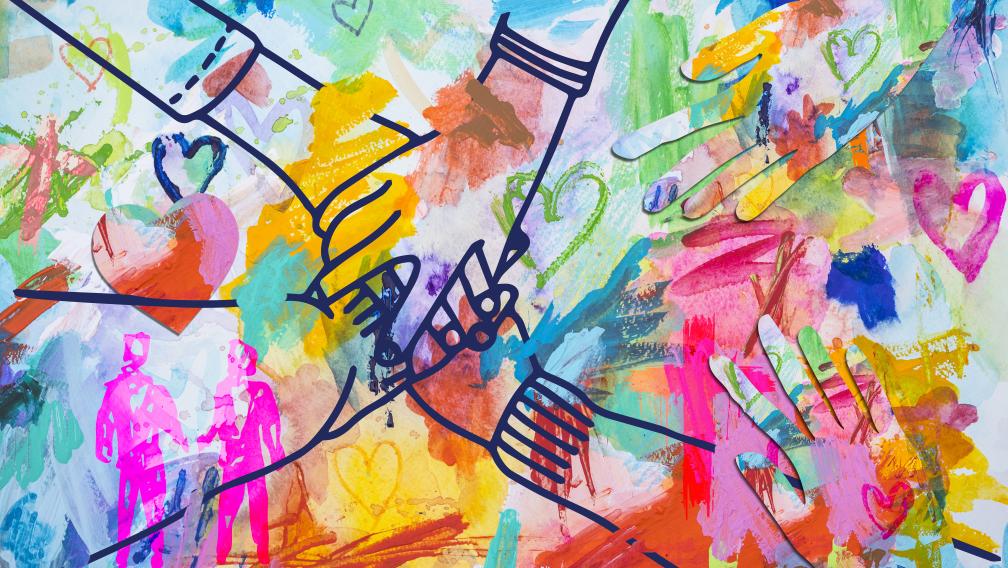How We Imitate Jesus’s Way of Love

“For all of them have contributed out of their abundance, but she out of her poverty has put in everything she had, all she had to live on.” — Mark 12:44
Jesus sees the widow. His eyes are always on the one who goes unnoticed, the one who is rejected, or the most vulnerable. His eyes are always turned toward those without social or economic importance.
The scene takes place at the temple in Jerusalem, a sprawling complex of structures more like a campus than a cathedral. It’s the last we see of Jesus’s public ministry before his death and resurrection. Picture Jesus surrounded by rich, well-respected people contributing large sums of money to the temple treasury — and him drawing the disciples’ attention to the poor widow among them giving two small coins, everything she has.
Jesus is there to judge and to warn. He criticizes certain temple scribes, their showy religiosity and faithless exploitation of some of the most defenseless people in society. In contrast to their hypocrisy, Jesus points to the widow’s act of faith, how her humble offering demonstrates deep trust in God. This minor character in the Gospels is for us an exemplar of genuine holiness.
The late New Testament scholar Daniel Harrington, S.J., interprets the contrast between the wayward scribes and the destitute widow in this way: “Be slow to judge holiness by appearances only and be slow to equate holiness with office, credentials and honors. Look beyond appearances and externals, and you may well find to your surprise some very holy persons. These persons are loving and generous — not full of themselves and their own achievements — and knowing and acknowledging their dependence on God.”
These words remind us that holiness is not about outward performance. Rather, holiness is an intimacy with God that inspires us, from the inside out, to imitate Jesus’s way of self-giving love. As Christians, we’re called to grow in holiness; growing in our relationship with God is how we live authentic Christian lives. In contrast to piety, which is concerned with appearances, holiness is as much about our inner spiritual growth as it is about our faithful actions in the world.
Holiness is as much about our inner spiritual growth as it is about our faithful actions in the world.”
The good news is we are not on our own in this. We nurture holiness by praying and reflecting; by studying scripture; by serving and volunteering; and by walking alongside, and learning from, one another. We draw close to God by drawing close to our neighbors in and outside of church, sharing in Sunday Eucharist, and sharing our everyday lives. On the path of holiness, God’s Spirit empowers us to participate in God’s healing work on earth every single day.
Our times are calling us, in vulnerability and trust, to the faith-filled self-offering modeled by the widow in the temple. It’s the kind of risky offering that goes well beyond doing and changes our very being. As we look inside ourselves, may this story stir within us questions for reflection: Who am I? Who do I want to become? Who is excluded from my view? And just how much am I willing to sacrifice?
Turn the eyes of our hearts, Loving God,
to Your holy service in this troubled world.
May we offer all of who we are and hope to become
to You and to those You love, in faithful commitment
and in widening circles of concern. May our commitment
include serious examination of our complicity
with current systems of oppression and violence.
May the love flowing out of Your Church strengthen us
for the work of justice and peace. Amen.
Read all of Sunday’s scriptures
Step Into the Story
Here are some ways to think about how God empowers us for healing work in the world:
Poetry
In “Prayer,” former poet laureate of New York State Marie Howe points to the ways life can tug on our authentic aspirations to holiness. Listen as she reads it: “Every day I want to speak with you. And every day something more important calls for my attention . . .”
Music
Activist Yara Allen teaches “Somebody’s Hurting My Brother,” a social justice rallying song to help us embody Jesus’s solidarity with the poor and the vulnerable.
Theology
In this collection of quotes and prayers, civil rights leader Howard Thurman’s words express a determined kind of hope in God transforming us from the inside out: “We wait. We wait, our Father, until at last something of thy strength becomes our strength, something of thy heart becomes our heart, something of thy forgiveness becomes our forgiveness. We wait, O God, we wait.”
Art
The Visual Commentary on Scripture is a free online resource that provides material for reflecting on the Bible and theology through art. In this collection, three very different pieces from across history interpret the story of the widow’s offering.
Social Justice
Priest and theologian Emilie Teresa Smith describes the stubborn faith of revolutionary poet Julia Esquivel: “Young and filled with passion, she actually expected the widows and orphans to be cared for and the poor to be attended to with compassion. She believed this concrete truth: Jesus Christ made room for everyone at the table, starting with those who had been rejected by the world.”
Kathy Bozzuti-Jones is Associate Director, Spiritual Practices, Retreats, & Pilgrimage, at Trinity Church.





